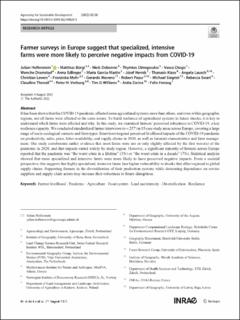Farmer surveys in Europe suggest that specialized, intensive farms were more likely to perceive negative impacts from COVID-19
Helfenstein, Julian; Bürgi, Matthias; Debonne, Niels; Dimopoulos, Thymios; Diogo, Vasco; Dramstad, Wenche; Edlinger, Anna; Garcia-Martin, Maria; Hernik, Józef; Kizos, Thanasis; Lausch, Angela; Levers, Christian; Mohr, Franziska; Moreno, Gerardo; Pazur, Robert; Siegrist, Michael; Swart, Rebecca; Thenail, Claudine; Verburg, Peter H.; Williams, Tim G; Zarina, Anita; Herzog, Felix
Peer reviewed, Journal article
Published version
Permanent lenke
https://hdl.handle.net/11250/3027381Utgivelsesdato
2022-08-23Metadata
Vis full innførselSamlinger
- Divisjon for kart og statistikk [564]
- Publikasjoner fra CRIStin - NIBIO [4576]
- Vitenskapelige artikler [1416]
Sammendrag
It has been shown that the COVID-19 pandemic affected some agricultural systems more than others, and even within geographic regions, not all farms were affected to the same extent. To build resilience of agricultural systems to future shocks, it is key to understand which farms were affected and why. In this study, we examined farmers’ perceived robustness to COVID-19, a key resilience capacity. We conducted standardized farmer interviews (n = 257) in 15 case study areas across Europe, covering a large range of socio-ecological contexts and farm types. Interviews targeted perceived livelihood impacts of the COVID-19 pandemic on productivity, sales, price, labor availability, and supply chains in 2020, as well as farm(er) characteristics and farm management. Our study corroborates earlier evidence that most farms were not or only slightly affected by the first wave(s) of the pandemic in 2020, and that impacts varied widely by study region. However, a significant minority of farmers across Europe reported that the pandemic was “the worst crisis in a lifetime” (3%) or “the worst crisis in a decade” (7%). Statistical analysis showed that more specialized and intensive farms were more likely to have perceived negative impacts. From a societal perspective, this suggests that highly specialized, intensive farms face higher vulnerability to shocks that affect regional to global supply chains. Supporting farmers in the diversification of their production systems while decreasing dependence on service suppliers and supply chain actors may increase their robustness to future disruptions.

